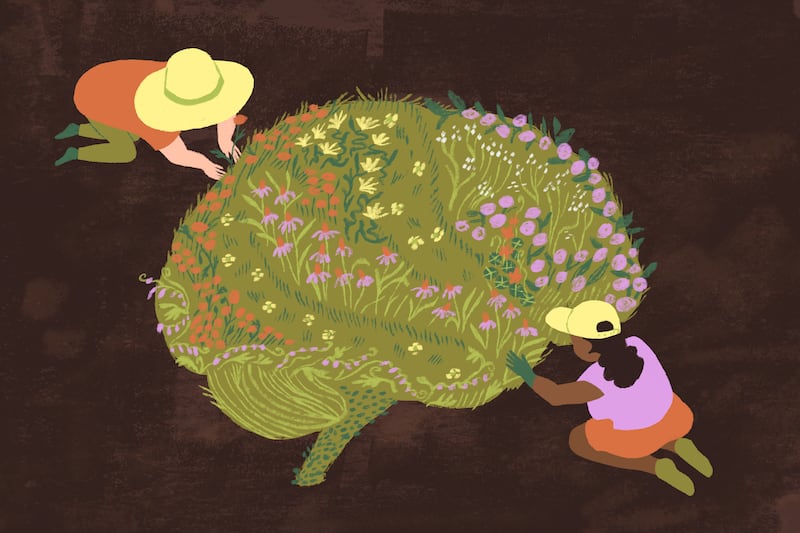Meg Stringam Bjorklund was 13 when she felt like her life fell apart. She changed schools, lost all her friends and struggled with anxiety, depression and suicidal thoughts. Her family was at a loss for how to help her.
Things began to change for Meg when her mom started working for a service organization with their church. At first, Meg had no desire to participate: “The last thing I wanted to do was go out and serve in my community with people I’d never met and interact in awkward situations.”
But over time, her perspective changed. As she cooked food, painted walls, served at homeless shelters and entertained children, she came to see other people — and herself — differently. “It made me realize that I’m not the only one who struggles. And I could help these people by giving them a hot meal and seeing a smile on their face,” she said.
In 2023, the surgeon general indicated we are experiencing an epidemic of loneliness in the United States. One in five teens and one in four young adults report serious symptoms of depression or anxiety and have seriously considered ending their lives. While service is not a substitution for mental health treatment for severe anxiety and depression, new research suggests that service can help teens and young adults build emotional resilience and improve mental health.
As Meg found, when we step outside of our concerns to help others, we make connections, develop resilience and increase happiness.
For example, research has found that serving others helps teens develop better self-esteem, which then protects against depression and anxiety.
One study found that when teens engaged in higher levels of service at age 13, their self-esteem increased by almost 20% one year later, and their rates of depression decreased by over 25% a year after that — at age 15.
This study focused on the unique benefit of helping strangers, or people that teens don’t know personally. The research suggests that going out of one’s comfort zone to help strangers is a “high-cost” behavior that is especially protective. The study found that in addition to boosting self-esteem, helping strangers was also related to teens feeling higher levels of hope, persistence and gratitude. All of these character strengths contribute to emotional resilience.
While helping strangers is especially protective for teens, research has found that helping family members is more consistently important for young adults (people in their 20s). This is a time of life when young people are facing a great deal of change and transition, and mental health challenges are at an all-time high for this group.
In a study conducted in 14 different countries during the COVID-19 pandemic, researchers found that the only thing that protected against depression across all 14 countries was service toward family members. Young adults reported acts of service such as buying groceries for a grandmother, picking up younger siblings and cleaning for their parents. Family became an essential protective factor against mental health challenges amidst the adverse circumstances of a global pandemic.
As another example of how service can help young adults who face mental health challenges, Grace Walker started struggling with depression in high school, and by the time she graduated she was seriously struggling with suicidal thoughts. Her condition improved as she worked with a therapist, but she said what helped her most was her family, the support they provided her, and the ways she found to serve them.
In particular, she found creative ways to serve her younger brother. Grace created original board games for him, complete with elaborate imaginary worlds that followed his interests. Family members appeared as characters in the games with various powers and abilities. Though the family teased Grace’s dad when one of his character’s special abilities was to eliminate foes with his lethal lecturing, she found purpose and strength by doing something that brought her brother and family so much joy. Over time, Grace earned a technical degree and is now working part time helping the elderly and autistic children. She discovered that serving others helps her to forget herself. Serving her family helped her realize that she is important and needed.
As more evidence of the essential role of family in promoting resilience during young adulthood, a forthcoming study in the US found that helping family members at age 18 was associated with about a 15% increase in self esteem at age 23 – 5 years later. In turn, self esteem was related to a 40% reduction in levels of depression, 20% reduction in anxiety, and a 50% reduction in suicidal ideation.
These findings suggest that parents are still very important in the lives of their young adult children. Helping behavior toward strangers and family members provide teens and young adults with higher feelings of self-worth and arm them with the emotional resilience needed to thrive.
Once again, service opportunities are not a substitute for necessary mental health services. When young people are in crisis, they should be referred to professionals. But we should not neglect the benefits they can experience as they reach out in service to others. As teens and young adults serve others, they feel better about themselves and become more resilient. As Abraham Lincoln once said, “To ease another’s heartache is to forget one’s own.”



